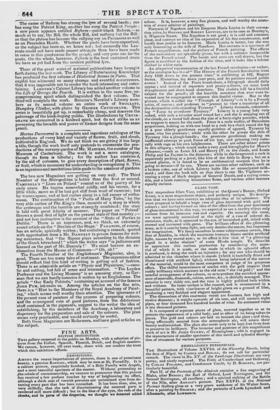The two new Magazines are getting on very well. The
Third Number of the Metropolitan is better than the first or second. CAMPBELL'S "Lines on Poland" remind us of the poetry of his early years. He begins somewhat coldly, and his verses, for a little while, move as if he had got stiff from want of exercise; but he warms apace, and at last rushes along in a full career of enthu- siasm. The continuation of the " Pacha of Many Tales," by the very able author of The King's Own, consists of a story in which the grotesque and the horrible are strangely combined ; the story is told with great felicity of manner. The paper on "Poland" throws a ;rood deal of light on the present state of that country ;- and not less instructive is the account of the "State of Parties in Dublin." There is an ingenious, and, we think, an extremely sound article on the "Decline of the Stage." PAGANINI, of course, has an article, spiritedly written ; but containing a remark, quoted with approbation from a Mr. DANNELY (a person famous for writ- ing nonsense), that "the Signor plays according to the division of the Greek tetrachord ! " which the writer says ".is judicious and learned on the part of Mr. Dannely !" We must borrow an ex- clamation from the House of Commons—" Oh, oh ! "
The Fourth Number of the Englishman's Magazine, also, is good. There are too many tales of sentiment. The ingenious editor :should reflect that this kind of writing is getting out of fashion. There is an admirable article on "Physic and Physicians,"—caus- tic and cutting, but full of sense and information. "The Leyden Professor and the Living Mummy" is an amusing story, so Ger- man that we can hardly conceive it written by an Englishman. The Article "Our Early Patriots," containing an account of the famous JOHN PYM, interests us. Among the articles on the fine arts, there is a "Hint to the Members of the Royal Academy of Paint- ing," which seems well worthy their attention. The ignorance of the present race of painters of the process of preparing colours, and the consequent ruin of good pictures, from the deleterious 'stuff contained in the pigments, suggest to the writer the idea of establishing, by the members of the Academy, a laboratory and dispensary for the preparation and sale of the colours. The plan seems very practicable, and would certainly be useful.
Both these Magazines are Reformers, and'have good articles on the subject.


























 Previous page
Previous page